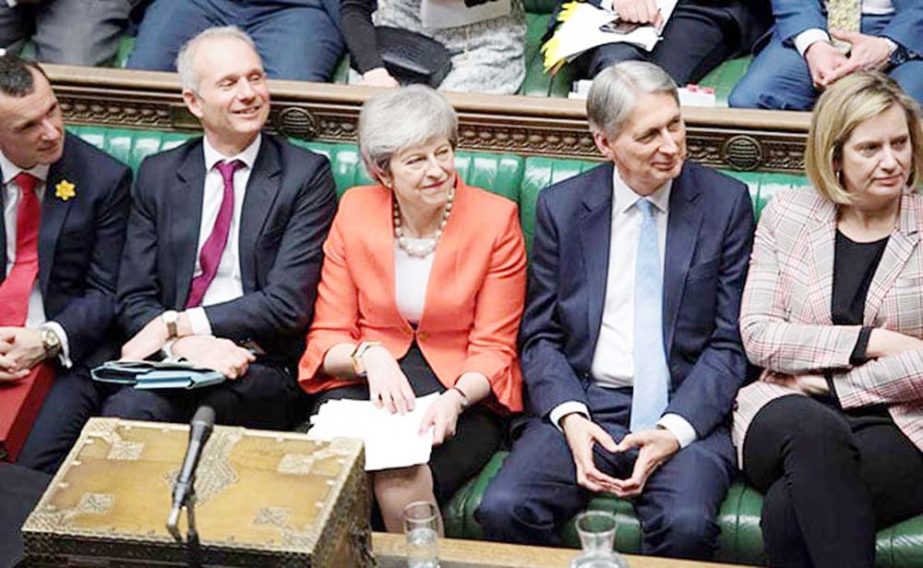
British members of parliament agreed Wednesday to give Prime Minister Theresa May more time to work on her EU withdrawal deal after she promised they could delay Brexit if necessary, but European leaders warned that any postponement would come with conditions.
MPs voted by 502 to 20 to endorse May’s plan, a radical shift in strategy made only after the threat of revolt by ministers who fear Britain crashing out of the European Union on March 29 without a deal.
May is still seeking changes to a withdrawal agreement struck with the EU late last year, which she hopes will be enough to get it through parliament’s lower House of Commons.
But if she fails, she has promised MPs votes on March 13 and March 14 on whether to leave the bloc without a deal, and if not, to seek a short delay.
“The government’s policy is to get the legally binding changes so a deal can be brought back to this house… and we can leave on March 29 with a deal,” May said.
Any delay must be approved by the other 27 EU member states, and the bloc’s leaders have agreed to look at any request from Britain.
But some questioned what it would achieve without a breakthrough in London, where MPs still cannot agree how to implement the 2016 Brexit referendum result.
“We don’t need more time: what we need most of all is a decision,” French President Emmanuel Macron said after meeting German Chancellor Angela Merkel in Paris.
In Madrid, Prime Minister Pedro Sanchez said: “Although Spain will not oppose granting a possible extension, this must have an assured perspective of resolution.”
May had repeatedly ruled out delaying Brexit, even after her deal-covering citizens’ rights, the financial settlement, a transition period and plans for the Irish border-was overwhelmingly rejected by MPs in January.
Her U-turn on Tuesday prompted outrage among hardliners in the ruling Conservative party, with influential anti-EU MP Jacob Rees-Mogg warning that “any delay to Brexit is a plot to stop Brexit”.
Twenty Conservatives rebelled against the prime minister during the main vote on Wednesday, while many others abstained. However, May’s change of plan averted a rebellion by pro-Europeans who fear economic chaos if Britain ends its 46-year-old relationship with the EU without a deal.
In a rare moment of unity, MPs moved on Wednesday to protect the rights of 3.6 million Europeans living in Britain and one million Britons in the EU in case of a “no deal”.
They backed without a vote an amendment urging the government to try to preserve the expat rights set out in the divorce agreement, whatever happens.
May’s government has already vowed to protect the rights of those in Britain but agreed to try to encourage a joint EU approach.
Opposition to the Brexit deal, agreed in November after almost two years of negotiations between London and Brussels, is focused on the so-called backstop plan to avoid checks on the Irish border.
May is seeking legal guarantees of the temporary nature of the arrangement, which Conservative MPs fear would keep Britain in the EU’s customs union indefinitely.
The opposition Labour party by contrast wants a new customs union with the bloc after Brexit, but its plan was defeated by 323 to 240 on Wednesday evening.
Labour leader Jeremy Corbyn dramatically shifted his own position on Brexit this week by opening the door to backing a second referendum.
After Wednesday’s defeat, he said: “We will back a public vote in order to prevent a damaging Tory Brexit or a disastrous no deal outcome.”
But he said Labour would also “continue to push for the other available options to prevent those outcomes, including a close economic relationship based on our credible alternative plan or a general election”.
MPs also voted by 324 votes to 288 against a Scottish National Party motion to avoid “no deal”.
The beleaguered British leader is also set to face a series of votes on various amendments tabled by MPs, including cross-party moves to lock in her commitments made on Tuesday.
Under May’s proposals, she will have two more weeks to try to win concessions from the EU over the so-called “backstop” clause to keep the Irish border open in all scenarios.
Parliament will vote on any revised deal by March 12, and if lawmakers again refuse to back it, they would then vote the next day on whether Britain should leave without a deal.
Following that measure’s expected defeat, they would then decide on March 14 on a “short, limited” extension of no more than three months before Britain leaves the EU.
“They are commitments I am making as prime minister and I will stick by them,” May vowed on Tuesday.
But an amendment put forward by Labour MP Yvette Cooper and Tory backbencher Oliver Letwin, seeks to bind her government into the steps, and to bringing forward the “necessary legislation to change the exit date.”
Meanwhile the main opposition Labour Party said it would be tabling an amendment with five demands, including Britain remaining in a customs union with the EU after Brexit.

